Bam Aquino Law
Sen. Bam calls on stakeholders, leaders to unite for education reform
Sen. Bam pushes for more opportunities for PWDs
As the world celebrates International Day of Persons with Disabilities on Sunday (Dec. 3), Sen. Bam Aquino reiterated the call for the passage of his two measures that support Filipino PWDs and provide them with the needed assistance.
“We need to ensure that our PWDs are given proper assistance and opportunities to make a living,” said Sen. Bam, who filed Senate Bill No. 356 and 1249 in the 17th Congress.
Under Senate Bill No. 1249, government agencies and private offices must allot two and one percent of their workforce, respectively, to PWDs.
“This bill seeks to create more job opportunities for PWDs in the workforce and provide commensurate compensation, benefits and employment terms for PWDs as any other qualified employee,” Sen. Bam said.
Senate Bill No. 356 aims to provide mandatory Philhealth coverage for PWDs, to ensure that their health is protected.
“Social services should be provided to those with the least in society. Health services should be provided to those who need it the most,” Sen. Bam said, referring to Senate Bill No. 356.
The two measures aim to amend Republic Act 7277 or the “Magna Carta for Persons with Disability” to accommodate the latest benefits and privileges for PWDs.
In the 16th Congress, Sen. Bam worked for the welfare of PWDs as co-author of Republic Act 10754 in the Senate. The law exempts PWDs from paying the value added tax (VAT) and gives tax incentives to persons with PWD dependents, up to fourth civil degree of consanguinity or affinity.
Sen. Bam: Public schools to teach financial literacy soon
Sen. Bam Aquino expects that money management and business training will be taught in public schools starting next school year to equip students with the needed knowledge in managing their finances and encourage them to become entrepreneurs in the future.
During this speech at the 6th UNESCO-APEID meeting on entrepreneurship education atMiriam College recently, Sen. Bam informed participants that the Youth Entrepreneurship Act has already been enacted into law as Republic Act 10679 in 2015.
The law encourages young would-be entrepreneurs to establish their own business by providing them access to capital and other support. It also creates financial literacy modules in all levels of Philippine education, to inculcate a culture of enterprise development among the Filipino youth.
Sen. Bam said the Department of Education (DepEd) is currently finalizing the implementing rules and regulations (IRR) for RA 10679.
“We hope that by next school year, financial literacy and entrepreneurship will be taught in our public schools,” said Sen. Bam, the principal sponsor and co-author of RA 10679 in the Senate as chairman of the Committee on Trade, Commerce and Entrepreneurship in the 16th Congress.
Sen. Bam underscored the need to inculcate financial literacy to the hearts and minds of young Filipinos, saying the country ranked 68th in the world in terms of financial literacy in 2015, way behind our neighbors Malaysia, Thailand, Hong Kong and Singapore.
Furthermore, Sen. Bam said a 2015 survey by Standard & Poor’s revealed that only 25 percent of Filipino adults are knowledgeable on basic money management.
Sen. Bam hopes that the country will learn from the experience of different participants of the conference to enhance financial literacy and entrepreneurship education in the country.
Around 140 participants from the Asia-Pacific region, composed mainly of policy makers, educators, entrepreneurs and youth representatives, joined the 6th UNESCO-APEID meeting.
Sen. Bam calls on rural banks to expand support to small businesses
Sen. Bam elated by all-out support for free college education
Sen. Bam Aquino welcomed the government’s all-out support for the full implementation of the law providing free education in state colleges and universities, local universities and colleges (LUCs) and vocational schools under the Technical Education and Skills Development Authority (TESDA).
“We are happy with the government’s promise to go all-out in implementing this law for the benefit of Filipino students, especially those who are poor and underprivileged,” said Sen. Bam, referring to Republic Act 10931 or the Universal Access to Quality Tertiary Education Act.
“Natutuwa tayo at kaisa natin ang pamahalaan sa hangaring hanapan ng kailangang pondo para sa epektibong pagpapatupad ng batas na itinuturing na napakalaking reporma sa edukasyon sa bansa,” added Sen. Bam, the principal sponsor and co-author of the measure in the Senate during his stint as chairman of the Committee on Education.
Budget Secretary Benjamin Diokno expressed confidence that the P51 billion needed in the first year of implementation of the law can be sourced from the 2018 national budget. Diokno added that President Duterte is committed to implement the law by finding the needed budget for it.
Senate Finance Committee chairperson Loren Legarda also committed to find the necessary space in the 2018 budget for the implementation of RA 10931.
“Mahalagang mabigyan ng karampatang pondo ang batas na ito upang matupad ang layunin nitong mabigyan ng pagkakataon ang mas maraming Pilipino na makatapos ng kolehiyo at magkaroon ng magandang kinabukasan,” stressed Sen. Bam.
The law provides free education to students in SUCs, local universities and colleges (LUCs) and TESDA-run vocational schools. Aside from tuition fees, the government will shoulder miscellaneous and all other mandatory fees.
Scholarship grants will be made available to students of both public and private college and universities. It also provides a new and improved student loan program, where students can apply for financing for other education expenses.
In addition, students taking post-graduate studies can avail of the new and improved student loan program and scholarships under the law.
The measure was languishing in the legislative mill for years before it was passed during Sen. Bam’s time as chairman of the Committee on Education in the 17th Congress. This was Sen. Bam’s 19th law in his four years as senator.
Sen. Bam defends measures for start-ups, scientists and researchers
The Senate on Wednesday started plenary discussions on three measures that aim to provide needed assistance to innovative start-ups and benefits to support Filipino scientists and researchers.
Senator Bam Aquino, chairman of the Committee on Science and Technology, defended the three measures — Innovative Startup Act, Balik Scientist Act and Magna Carta for Scientists — during period of interpellation.
Sen. Bam, who stood as principal sponsor and co-authors of the said measures, underscored the importance of providing support to around 200,000 innovative start-ups in the country.
Innovative start-ups are businesses that provide unique and relevant solutions to pressing problems, from a simple application for finding a taxi and other systems for improving healthcare, supporting Filipino farmers and addressing unemployment.
“Our country has a number of promising start-ups and we need to provide them with the environment where they can grow and succeed, just like what their counterparts in other countries like United States and Israel are enjoying,” said Sen. Bam.
“Hopefully, this measure will unlock the potential of this sector. A lot of Filipino innovators are looking forward to this bill,” added Sen. Bam.
If enacted into law, innovative startups will enjoy benefits such as tax breaks and grants and other forms of assistance, including a faster process for business registration.
Innovative start-ups could also avail of technical assistance and training programs, free use of equipment, facilities and support for patenting or licensing of their product through the Intellectual Property Office of the Philippines.
Aside from the Innovative Start-up Act, the Senate also tackled the Balik Scientist Act and Magna Carta for Scientists, which both aim to ramp up support to Filipino scientists, engineers and researchers.
After the period of interpellation, the Senate will continue discussions on the said measures next month during period of amendments.
Sen. Bam: IRR key to effective implementation of free college education law
Sen. Bam Aquino stressed the need to engage and consult stakeholders before the implementing rules and regulations (IRR) for Republic Act 10931 or the Universal Access to Quality Tertiary Education Act is finalized.
“There are still a lot of details to iron out before the Commission on Higher Education’s IRR is finalized. Umiikot kami sa mga state colleges and para kunin ang panig ng mga estudyante at administrators ng mga paaralan,” said Sen. Bam.
“It is important to engage with all the stakeholders and come up with a most effective implementation plan,” added Sen. Bam, the principal sponsor and co-author of the measure in the Senate during his stint as chairman of the Committee on Education.
As a revolutionary reform in education, Sen. Bam underscored the need to hold healthy discussions on how to craft an IRR that will ensure effective implementation, based on its original intention of the law.
“Mahalagang mapag-usapan ang bawat detalye ng batas sa pagbuo ng IRR. Masasayang lang ang napakalaking repormang ito sa edukasyon kung hindi matututupad ang pangunahing layunin nito,” added Sen. Bam.
Sen. Bam said other important issues such as summer and make up classes, residency issues, and grade requirements should be tackled.
“Though we are not part of the group finalizing the IRR, we are committed to sharing the comments, concerns and suggestions we’ve collated from students, parents, teachers and other concerned citizens,” the senator said.
The law will provide free education to students in SUCs, local universities and colleges (LUCs) and vocational schools under the Technical Education and Skills Development Authority (TESDA). Aside from tuition fees, the government will shoulder miscellaneous and all other mandatory fees.
Scholarship grants will also be made available to students of both public and private college and universities. Plus, it provides a new and improved student loan program, where students can apply for financing for other education expenses.
If fully implemented, Sen. Bam said the law will benefit around two million students in all state universities and colleges and Technical Education and Skills Development Authority (TESDA)-run technical-vocational institutions in the country.
In addition, students taking post-graduate studies can avail of the new and improved student loan program and scholarships under the law.
The measure was languishing in the legislative mill for years before it was passed during Sen. Bam’s time as chairman of the Committee on Education in the 17th Congress. This was Sen. Bam’s 19th law in his four years as senator.
Sen. Bam: Tertiary education law also provides scholarships and loans to students
The Universal Access to Quality Tertiary Education Act offers more than just free education in state universities and colleges (SUCs), local universities and colleges (LUCs) and vocational schools under the Technical Education and Skills Development Authority (TESDA).
“Hindi lang libreng edukasyon sa SUCs at LUCs ang hatid ng batas na ito kundi ang pagpapatibay ng scholarship programs at student loan programs ng gobyerno para sa kapakinabangan ng ating mga estudyante,” said Sen. Bam Aquino, principal sponsor and co-author of the measure in the Senate.
Sen. Bam said one of the salient features of the Universal Access to Quality Tertiary Education Act or Republic Act 10931 is the new and improved student loan program.
While undergraduate students in LUCs and SUCs are covered by free tuition, students taking post-graduate studies can avail of the new and improved student loan program and scholarships.
“Through the student loan program, students can apply for financing for other education expenses outside of their miscellaneous and mandatory fees that will be shouldered by the government under the law,” said Sen. Bam.
In addition, Sen. Bam said the law also provides scholarship grants to students of both public and private college and universities by strengthening the existing Student Financial Assistant System (StuFAP) of the Commission on Higher Education (CHED).
After gathering dust in the legislative mill for years, the law was passed during Sen. Bam’s short stint as chairman of the Committee on Education in the 17th Congress. It was Sen. Bam’s 19th law in his four years as senator.
Sen. Bam also assured that lawmakers will make the necessary moves to ensure that the law will be properly funded and effectively implemented.
“With a more efficient use of our budget, there is more than enough fiscal space for this landmark reform,” said Sen. Bam.
Earlier, Sen. Bam thanked President Duterte for signing the important measure into law, saying that millions of Filipinos are the real winners with this revolutionary education reform.
“Pagkatapos ng ilang dekada, batas na ang inaasam-asam ng napakaraming pamilyang Pilipino na libreng kolehiyo,” said Sen. Bam, “Estudyante, magulang at pamilyang Pilipino ang tunay na bida ng batas na ito.”
Sen. Bam: Free college education effective weapon vs poverty, crime, illegal drugs
Sen. Bam Aquino believes that the free college education law recently signed by President Duterte can be a long-term solution to poverty, crime and even illegal drugs.
“A college degree can unlock a better job and better livelihood for Filipino families. It is an effective weapon and long-term solution to combat poverty, crime and drugs,” said Sen. Bam, the Senate’s principal sponsor and co-author of the Universal Access to Quality Tertiary Education Act or Republic Act 10931
“Ngayong may pagkakataon na ang maraming Pilipino na makatapos ng libreng kolehiyo, mas malaki ang tsansa nilang makaahon sa kahirapan at umasenso,” added Sen. Bam, who has been advocating for education, jobs and business as keys to lifting Filipinos out of poverty and giving them a chance at a better future.
Earlier, Sen. Bam thanked President Duterte for signing the important measure into law, saying that millions of Filipinos are the real winners with this revolutionary education reform.
“Pagkatapos ng ilang dekada, batas na ang inaasam-asam ng napakaraming pamilyang Pilipino na libreng kolehiyo,” said Sen. Bam, “Estudyante, magulang at pamilyang Pilipino ang tunay na bida ng batas na ito.”
The measure was languishing in the legislative mill for years before it was passed during Sen. Bam’s time as chairman of the Committee on Education in the 17th Congress. This was Sen. Bam’s 19th law in his four years as senator.
With this law, students will enjoy free education in state universities and colleges (SUCs), local universities and colleges (LUCs) and vocational schools under the Technical Education and Skills Development Authority (TESDA) starting the second semester of school year 2017-18.
Aside from tuition fees, the government will shoulder miscellaneous and all other mandatory fees.
Scholarship grants will also be made available to students of both public and private college and universities. Plus, it provides a new and improved student loan program, where students can apply for financing for other education expenses.
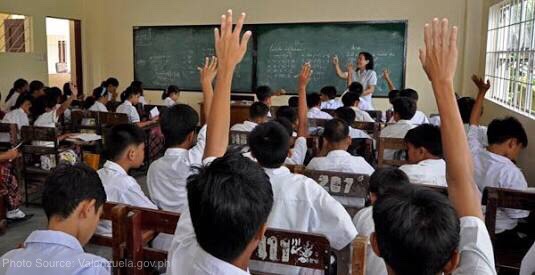
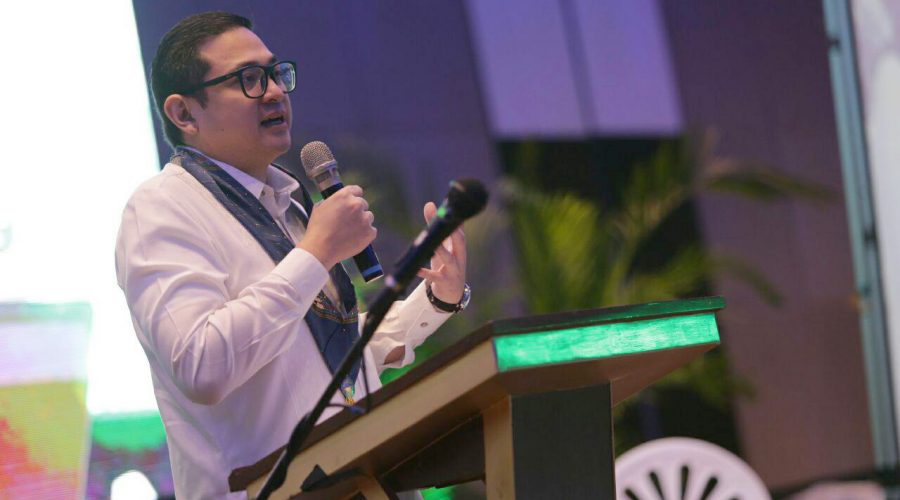
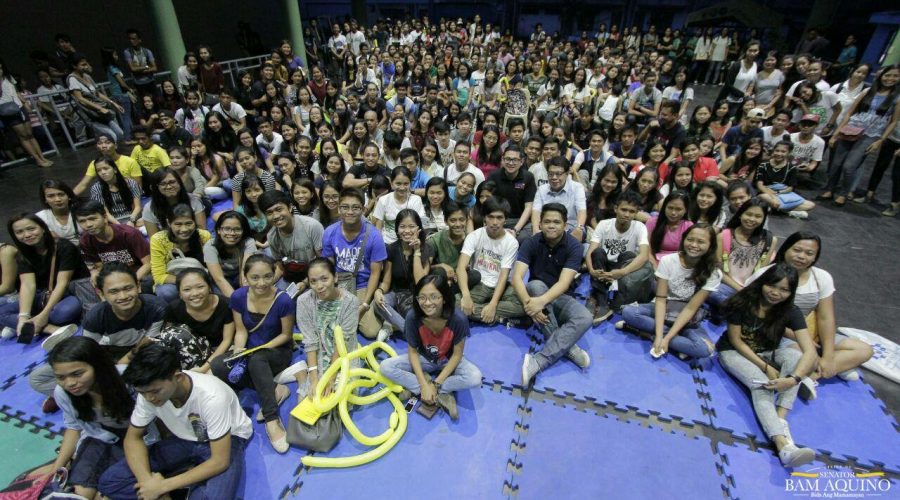
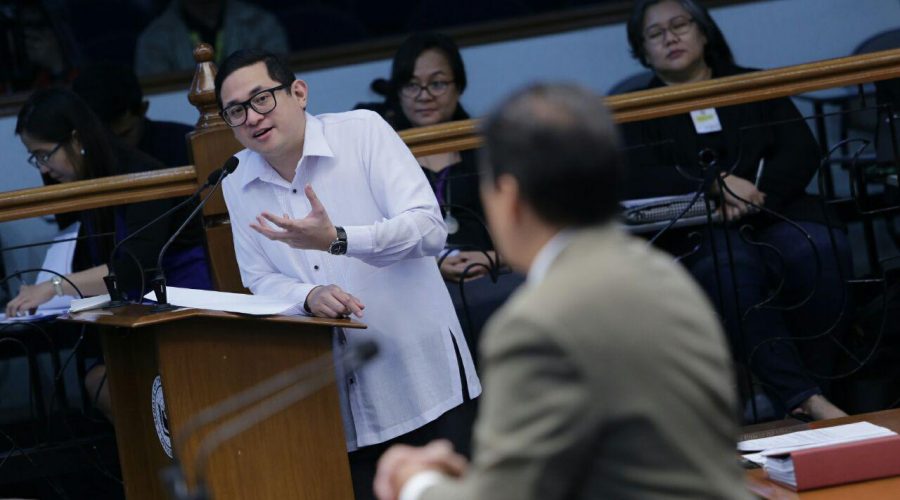

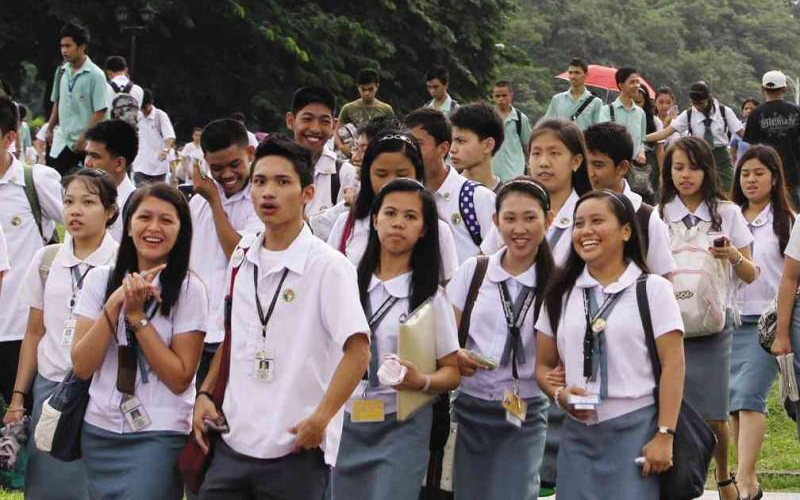
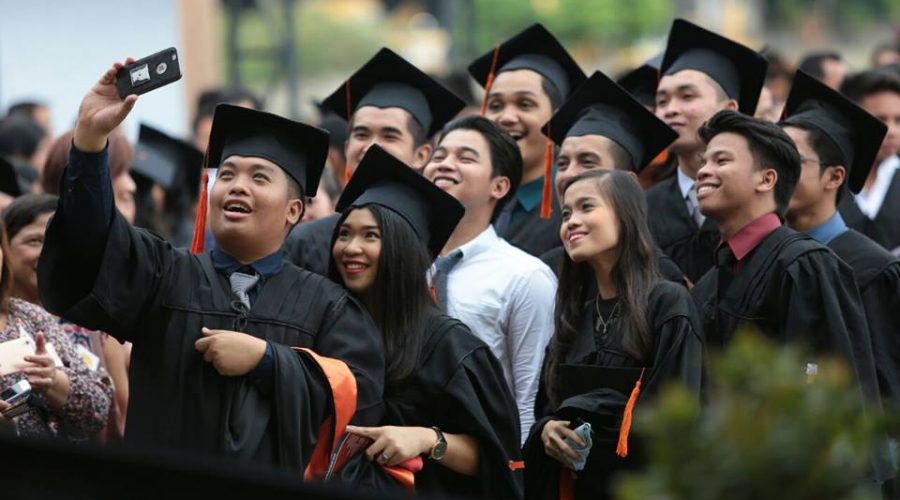
Recent Comments